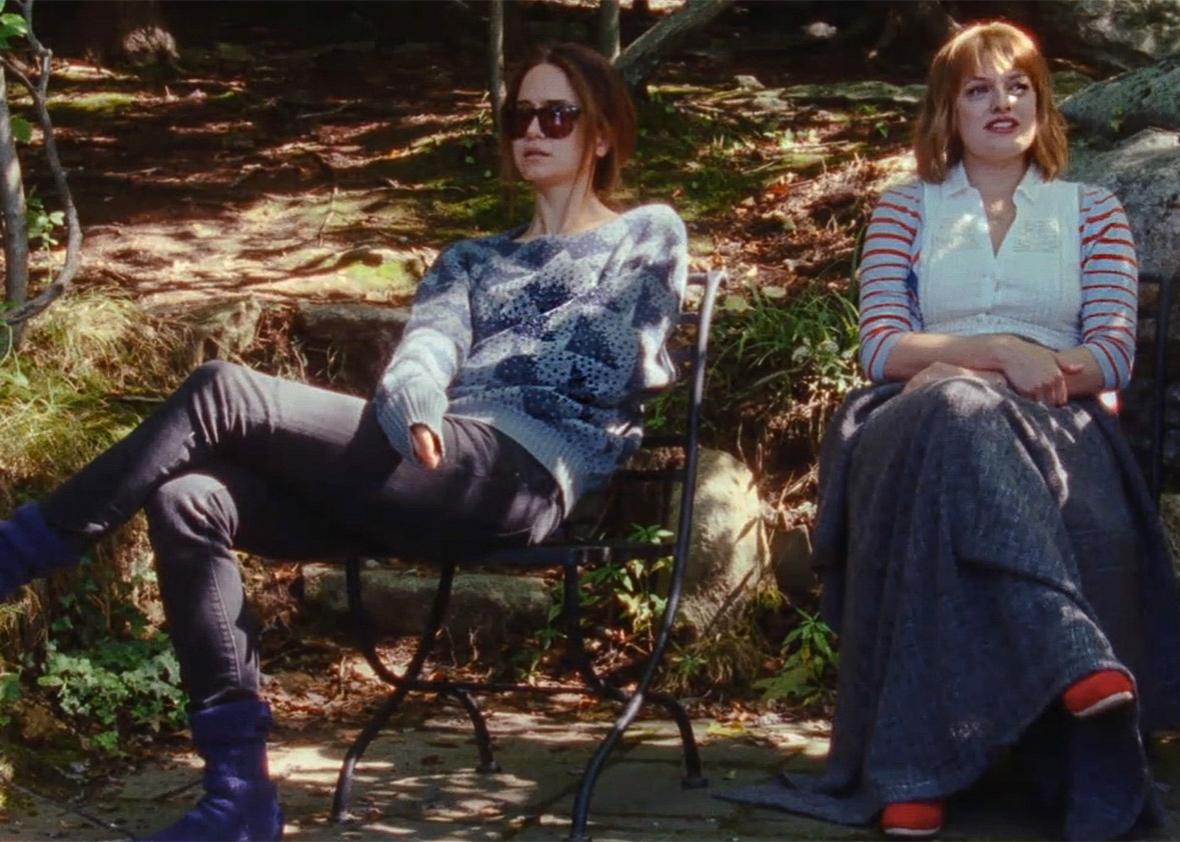If a friendship falls apart in the middle of a forest, and no one is around to hear it, does it make a sound? In Queen of Earth, Elisabeth Moss makes many: As the prickly Catherine, she deploys a collection of clucks, mewls, and barbed giggles, her voice the only bulwark against the collapse. Her boyfriend, James, has just broken up with her; her father, a famous artist, has just killed himself. She’s come to the lake house of her best friend Virginia (Katherine Waterston) to relax, regroup, and remake herself.
The house is nice; Catherine, less so. She spends most of her time turtled in bed. A backstory emerges in flashback: Virginia and Catherine’s trip to the house the previous summer was soured by James’ presence. In one spat by the lake, Catherine claimed to be a caring friend, and Virginia countered with a suggestion: “Well, we should trade places, see how we feel then.” A year later, the proposition looks like prophecy. They’ve returned to the lake, but now Catherine chafes at Virginia’s beau, a sly, smirking neighbor named Rich (Patrick Fugit). Over the following week, the bond between friends begins to fray, and Catherine’s pain transmutes into psychosis.
Queen of Earth is the fourth film by writer-director Alex Ross Perry, whose previous movies (including The Color Wheel and Listen Up Philip) have been, by and large, about miserable men. Queen of Earth is about miserable women, and it’s better for it. Catherine and Virginia are not unlike Perry’s other creations—they’re often brusque and often selfish—but their pettiness is rooted in fresher, deeper themes than male ego and ambition: fear, betrayal, forgiveness. That pivot frees Perry to make a movie that radically explores empathy—when and how to give it, when and how to withhold it, when and how it fails—in ways that the sprawling, more comic Philip groped at but couldn’t quite nail.
The film crystallizes half an hour in, when the women exchange a pair of sublime, slowly unspooling monologues. Each tells the story of a bygone lover, a man who, through neglect or naiveté, victimized her. Virginia ends the conversation with a wry observation: “You can get out of someone else’s cycle, but you can’t get out of your own.” But what if you can’t tell where your cycle ends and another’s begins? As the movie progresses, it becomes clear that Catherine and Virginia are intensely and psychically bound—not two sides of the same coin, exactly, but perhaps two iterations of the same spirit. Their intimacy runs deep and dark, and the damage they do to each other far outstrips the scabs of past breakups. Lovers can hurt, but the parry and thrust of friendship often draws more blood.
At this point, things may be sounding familiar. Critic Miriam Bale has written on a subgenre she dubs “persona swap,” in which two women, usually friends, begin to exchange psychological baggage. The form has a long lineage—Altman’s 3 Women, Bergman’s Persona, Aronofsky’s Black Swan. Sometimes these films play as horror, sometimes as melodrama, but Queen of Earth, though it fits in the category, is a more controlled cognate. The swap itself is only hinted at, and the tension only briefly erupts into full operatics. For the most part, the movie is a fever-dream study in doubles, and its prismatic depth compounds as Catherine slips into madness.
Much of the film’s power comes thanks to Moss, who after stealing Listen Up Philip unleashes the most vigorous, visceral performance of her career. Her face is in a state of constant squirm, and thanks to cinematographer Sean Price Williams’ roving close-ups, each tic, grimace, and gurn is a small gem of portraiture. Moss has played sharp-edged characters before, but they’ve always been laced with an endearing intelligence and baseline goodness. That’s gone here, and we instead get something that’s rougher and more abrasive. Catherine frequently complains of feeling like there are bones grinding beneath her face. Rich and Virginia roll their eyes, but I believed it.
Watching Queen of Earth, you realize that every single aspect of its production is reflective, meant to refract or clarify the dual personalities at its center. Robert Greene’s offbeat editing, Williams’ claustrophobic camerawork, Keegan DeWitt’s freaky, two-toned score: All Perry’s collaborators contribute to the interrogative mode of the filmmaking. The camera is restless and intrusive, but the characters are even more invasive, especially when it comes to Catherine: People keep prodding her, pinching her, provoking her. That sense of violation suffuses the entire movie. There are no boundaries, and the porous, borderless relationship Catherine and Virginia share is sublimated into the narrative. When the women host a party, people pop out of nowhere to obnoxiously needle Catherine about her dad, and the scene ends with her huddled on the floor, hallucinating a sweaty mass of arms and hands clamoring for her attention.
The ending, which arrives with a laugh and a sob, is good but maybe too pat. More enduring are the many scenes of Catherine and Virginia standing alone across a room or corridor or doorway, staring at each other in silence. These moments don’t seem literal so much as clever dramatizations of inner gaze, emotional paralysis and a failing friendship depicted through physical distance. The movie is full of these moments, so that we’re never sure if we’re watching Catherine and Virginia, watching them watch each other, or watching one talk to herself. But maybe this is the way the world ends: not with a bang but with a mirror.
